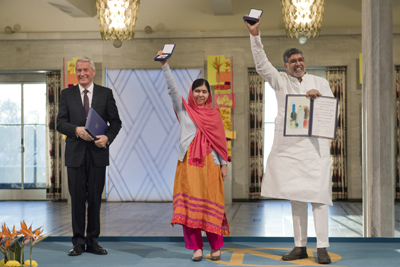
DAVID ADAMS tracks down some details about the Nobel Peace Prize and its history…
News this week that the residents of the Greek Islands are being nominated for this year’s Nobel Peace Prize for their efforts to help asylum seekers arriving from the Middle East and North Africa. But just what is a Nobel Peace Prize and why is it so famous?

Malala Yousafzai and Kailash Satyarthi, 2014 Nobel Peace Prize Laureates. PICTURE: © The Nobel Foundation/Ken Opprann
• The origins of the Nobel Peace Prize lie, like the other original five Nobel prizes, in the will of Alfred Nobel who bequeathed most of his fortune to financing a series of annual prizes including one for the “person who shall have done the most or the best work for fraternity between nations, for the abolition or reduction of standing armies and for the holding and promotion of peace congresses” – aka the Nobel Peace Prize.
• Anyone can be nominated for the prize (although only nominations by “valid nominators” are considered), which carries a cash prize of variable value (in 2014, it was eight million Swedish kronor, then around $US970,000). Nominations must be made before 1st February each year and the Norwegian Nobel Committee, comprised of five members appointed by Norway’s Storting or Parliament (the other Nobel Prizes are decided by Swedish-based committees), meet several times before making a decision in early October. The award ceremony is always held on 10th December – the date of Alfred Nobel’s death.
• The Nobel Peace Prize has been awarded 96 times since 1901 – it’s been shared by two people on 29 occasions and twice been shared among three people.
• The 129 recipients include 103 individuals and 26 organisations. Individual Nobel Peace Prize laureates include European doctor, missionary, philosopher and musician Albert Schweitzer (1953), American civil rights leader Martin Luther King, Jr (1964), former West German chancellor Willy Brandt (1971), Mother Teresa (1979), Mikhail Gorbachev – last President of the USSR (1990), and Irish peace-makers John Hume and David Trimble (1998). Organisations which have received the prize include the International Committee of the Red Cross (three times – 1917, 1944, and 1963), the Office of the United Nations High Commissioner for Refugees (UNHCR) (twice – 1954 and 1981), and the International Atomic Energy Agency (2005).
• While the average age of individual recipients is 61 years, the youngest person to ever receive the prize is Pakistani schoolgirl Malala Yousafzai (pictured above), who was just 17-years-old when she received it in 2014 along with Kailash Satyarthis for “their struggle against the suppression of children and young people and for the right of all children to education”. The oldest was Joseph Rotblat, who was 87 when he and the Pugwash Conferences on Science and World Affairs were awarded the prize in 1995 “for their efforts to diminish the part played by nuclear arms in international politics and, in the longer run, to eliminate such arms”.
• Only 16 of the 103 individuals who have received the prize have been women – the first was Czech-Austrian pacifist and writer Bertha von Suttner in 1905, the last was Malala in 2014. Geographically speaking, the majority of winners, as of 2001, have been from Western Europe (44) with the lowest number coming from Africa (just six).
• Only one Nobel Peace Prize has ever been awarded posthumously – to former UN Secretary General Dag Hammarskjold in 1961 (he had died in a plane crash in suspicious circumstances in September that year). This is unlikely to happen again as in 1974, the governing statutes were changed to state the prize cannot be awarded posthumously unless death occurs after the prize has been announced.
• There have been 19 years since 1901 in which a Nobel Peace Prize was not awarded including for some years during both World War I and II.
• The only person to have ever refused to accept the prize was Vietnamese Communist leader Le Duc Tho who was awarded the prize in 1973 with US Secretary of State Henry Kissinger. This has also proved one of the most widely criticised prizes (as in more recent times was that awarded to US President Barack Obama after only nine months in the job – a decision which has led to accusations that the prize was becoming increasingly politicised).
• And finally, a look at the winners list does reveal some surprises – among those not included are Mahatma Gandhi (he was nominated several times) and Winston Churchill (he did win a Nobel Prize – that for Literature). Meanwhile, among the most unlikely people known to have been nominated for the prize are Adolf Hitler (in 1939, although it was apparently not meant to be taken seriously), and Joseph Stalin (in 1945 and in 1948 in relation to his efforts to end World War II).
Sources: Nobel Prize, Nobel Peace Prize, TIME – ‘What a Nobel Prize is worth’





